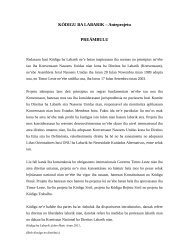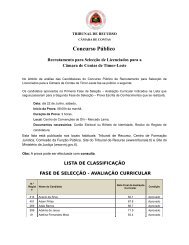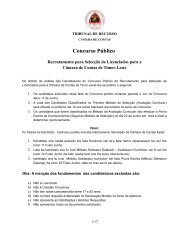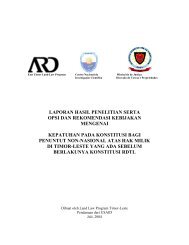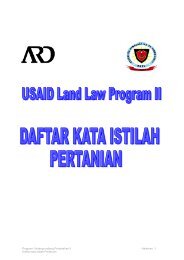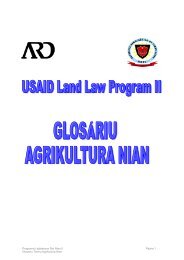English
English
English
Create successful ePaper yourself
Turn your PDF publications into a flip-book with our unique Google optimized e-Paper software.
EAST TIMOR<br />
LAND EXPROPRIATION<br />
POLICY SUITABLE FOR<br />
TIMOR-LESTE<br />
ECONOMIC CONSIDERATIONS<br />
JULY 2005<br />
This publication was produced for review by the United States Agency for<br />
International Development. It was prepared by ARD, Inc.
East Timor Land Law Program II<br />
Contract No. PCE-I-00-99-00001-00, Task Order No. 828<br />
Under the Rural and Agricultural Incomes with a Sustainable Environment (RAISE)<br />
Indefinite Quantity Contract<br />
AUTHOR:<br />
Ganesh P. Shivakoti<br />
COVER PHOTO:<br />
Ganesh P. Shivakoti and<br />
Ram Chandra Bastakoti, ARD, Inc.
LAND EXPROPRIATION<br />
POLICY SUITABLE FOR<br />
TIMOR-LESTE<br />
ECONOMIC CONSIDERATIONS<br />
JULY 2005<br />
DISCLAIMER<br />
The author’s views expressed in this publication do not necessarily reflect the views of the<br />
United States Agency for International Development or the United States Government.
CONTENTS<br />
ACRONYMS ............................................................................................ ii<br />
1. BACKGROUND .................................................................................... 1<br />
2. NEED FOR LAND EXPROPRIATION IN TIMOR-LESTE .................... 2<br />
3. REVIEW OF INTERNATIONAL AND COMPARATIVE LAW<br />
REGARDING PUBLIC INTEREST........................................................ 3<br />
3.1 PUBLIC INTEREST UNDER INTERNATIONAL LAW ............................ 3<br />
3.2 PUBLIC INTEREST UNDER SOUTH AFRICAN AND<br />
COMPARATIVE CONSTITUTIONAL LAW .......................................... 3<br />
4. REVIEW OF INTERNATIONAL AND OTHER COMPARATIVE<br />
LAW REGARDING COMPENSATION ................................................. 5<br />
4.1 COMPENSATION ACCORDING TO INTERNATIONAL LAW .................. 5<br />
4.2 COMPENSATION ACCORDING TO SOUTH AFRICAN AND<br />
COMPARATIVE CONSTITUTIONAL LAW .......................................... 6<br />
5. REVIEW OF DIFFERENT COUNTRY CASES REGARDING<br />
EXPROPRIATION PROCEDURE, COMPENSATION MECHANISM<br />
AND RELATED POLICIES ................................................................... 8<br />
6. PROPOSED PROCEDURAL FRAMEWORK FOR LAND<br />
EXPROPRIATION IN TIMOR-LESTE................................................. 11<br />
BIBLIOGRAPHY........................................................................................ 12<br />
NON-CUSTOMARY PRIMARY INDUSTRY LAND SURVEY i
ACRONYMS<br />
ECHR European Court of Human Rights<br />
GA General Assembly<br />
GIS Geographic Information System<br />
MAFF Ministry of Agriculture, Forestry and Fisheries<br />
PCIJ Permanent Court of International Justice<br />
UNDP United Nations Development Programme<br />
NON-CUSTOMARY PRIMARY INDUSTRY LAND SURVEY ii
1. BACKGROUND<br />
Timor-Leste has approximately 15,000 km² of land area. Generally, the land can be conveniently divided<br />
into the following six ecological zones: mountainous areas, highland plains, moist lowland areas (along<br />
the southern coast), arid lowland areas (along the northern coasts), marine and coastal areas, and urban<br />
areas (UNDP/NORAD 2002). Currently, there is no up-to-date and reliable information available on land<br />
use and land cover in Timor-Leste. The last comprehensive assessment dates back to Indonesian aerial<br />
photography carried out in 1993 (Table 1). Based on that information, nearly 14% of the country’s land is<br />
non-productive.<br />
TABLE 1: AREAS OF LAND USE BY CATEGORY, 1993<br />
Land Use Category Area (Hectares) Distribution (Percent)<br />
Forest<br />
Lowland 761,486 51.0<br />
Highland, coastal and other<br />
Agricultural Land<br />
92,768 6.2<br />
Estate Crops 74,578 5.0<br />
Food and other 336,400 22.5<br />
Non-productive Land 203,152 13.6<br />
Cities, Towns, Villages 19,934 1.3<br />
Lakes 5,080 0.3<br />
Total 1,493,398 100.0<br />
Source: MAFF, Agricultural Land Use and GIS Unit<br />
The absence of efficient and effective policy on land use in Timor-Leste has jeopardized and impeded<br />
efficient use of available and productive land in the country. Large parcels of unutilized public lands exist<br />
in different parts of the country. Those parts of public lands now in use are underutilized. Cases likewise<br />
exist where nationals own excessive landholdings and where foreign nationals similarly control<br />
productive land. This argues for a clear-cut policy and guidelines for managing scarce land resources for<br />
the economic benefit of nationals and the country as a whole. Informed by review of international law,<br />
comparative country cases, and the Timor-Leste context, this report proposes policy options for land<br />
expropriation in East Timor.<br />
NON-CUSTOMARY PRIMARY INDUSTRY LAND SURVEY 1
2. NEED FOR LAND<br />
EXPROPRIATION IN<br />
TIMOR-LESTE<br />
Expropriation refers to a government action in taking or modifying property rights in the exercise of<br />
sovereignty. The government of any country has the right to take private property for a public purpose. In<br />
principle, expropriation involves the owner receiving “just compensation” to indemnify him/her for<br />
his/her economic loss. Legally, the government can take property from a private owner for public use by<br />
virtue of the superior dominion of its sovereignty over all lands within its jurisdiction. In practice,<br />
expropriation means the taking over of private property by a government, often without fair compensation<br />
but usually with a legal assertion that the government has a right to do so. In the case of land,<br />
expropriation is seen as necessary to acquire space for public infrastructure projects, and also if land is<br />
underutilized, some farmers own excessive amounts of land, or where absentee landlords control land.<br />
This mainly occurs in countries where property laws are not concrete and well defined. Expropriation also<br />
occurs when there are legal implications.<br />
Mainly, expropriation is intended to facilitate achievement of public purposes. In certain cases,<br />
expropriations of privately owned land are intended to address “pressing security needs.” In addition,<br />
certain abandoned properties should be expropriated for public uses. Other reasons also justify the need to<br />
expropriate land, such as when foreign nationals possess excessive land, landlords mistreat workers, etc.<br />
In Timor-Leste, large parcels of public lands in different parts of the country are not in use; parts of public<br />
lands which are in use are underutilized; and, in some cases, foreign nationals hold excessive land. In<br />
addition to public lands, some abandoned private properties should likewise be expropriated for public<br />
uses. Finally, government may acquire land parcels for public infrastructure projects.<br />
2 NON-CUSTOMARY PRIMARY INDUSTRY LAND SURVEY
3. REVIEW OF INTERNATIONAL<br />
AND COMPARATIVE<br />
LAW REGARDING PUBLIC<br />
INTEREST<br />
3.1 PUBLIC INTEREST UNDER INTERNATIONAL LAW<br />
The right to expropriate property is not absolute; international law places limitations on governments’<br />
discretionary powers in this regard. The 1962 United Nations General Assembly Resolution on<br />
Permanent Sovereignty over Natural Resources (GA Res. 1962: Paragraph 4) stated that expropriation<br />
“shall be based on grounds or reasons of public utility, security, or the national interest which are<br />
recognized as overriding purely individual or private interests, both domestic and foreign. In such cases<br />
the owner shall be paid appropriate compensation in accordance with the rules in force in the state taking<br />
such measures in the exercise of its sovereignty and in accordance with international law.” This resolution<br />
is closely connected to the principle of self-determination, and it is important to note that it characterizes<br />
expropriation as a right inherent in sovereignty. This means that expropriation is prima facie lawful,<br />
provided that individual acts of expropriation meet the conditions established by international law.<br />
In 1926, the Permanent Court of International Justice (PCIJ) took the position in the Upper Silesia case<br />
that “expropriation for reasons of public utility, judicial liquidation and similar measures” was lawful. In<br />
a case against the government of Sweden, the European Court of Human Rights (ECHR) stated that a fair<br />
balance must be struck between the demands of the general interest and the requirement that the<br />
individual’s fundamental rights be respected. In addition to these requirements, international case law<br />
suggests that lawful expropriation must not be discriminatory, in the sense of its being deliberately<br />
directed against land-holding nationals of only a single foreign country.<br />
3.2 PUBLIC INTEREST UNDER SOUTH AFRICAN AND COMPARATIVE<br />
CONSTITUTIONAL LAW<br />
South African law sets out more detailed criteria for the definition of “public interest” in the context of<br />
expropriation. Article 25 (2) of the South African Constitution allows for expropriation “for public<br />
purposes or in the public interest.” The term “public purposes” is usually defined in contrast to “private<br />
purposes.” It would cover an expropriation by the state for the purposes of carrying out its administrative<br />
obligations such as building a road, a bridge or a hospital. An expropriation undertaken specifically to<br />
benefit a private individual or to advance the state’s commercial ventures would serve “private,” not<br />
“public” purposes, and would therefore be inadmissible.<br />
The same would not necessarily hold, however, for expropriations involving transfer of land from one<br />
private party to another in cases of land reform. Where an expropriation is intended to benefit the public<br />
at large rather than a private individual, even though it effectively results in a benefit accruing to a<br />
particular individual (e.g., expropriation to redistribute land under a land reform program), the transaction<br />
would nevertheless still clearly meet the test of public interest, and would therefore be constitutional.<br />
Courts thus have only limited scope to set aside an expropriation on the grounds of its purpose and are<br />
NON-CUSTOMARY PRIMARY INDUSTRY LAND SURVEY 3
generally inclined to respect the choices made by the legislature or executive as to where the public<br />
interest lies.<br />
Article 14 (3) of the German Constitution provides that “expropriation shall only be permissible in the<br />
public interest.” The public interest requirement has been interpreted to mean that expropriations cannot<br />
be undertaken solely for the benefit of the state’s commercial interests or those of a private person. It is<br />
possible, however, for a private person to benefit from an expropriation as long as the expropriation is<br />
undertaken in the execution of a public necessity. Expropriations for the purpose of land reform have also<br />
entered into case law in Australia, the Council of Europe and the United States. Those decisions are<br />
summarized as follows: “Generally, the position is that a broad, general program of land reform can be in<br />
the public interest and that individual expropriations would be for a legitimate purpose if they form part<br />
of such a program, even though the intention is to give or transfer the expropriated land, in terms of that<br />
program, to a private person.” (Treeger 2004)<br />
To dispel any lingering doubts in this regard, Article 25 (4) of the South African Constitution stipulates<br />
that the term “public interest” must be interpreted so as to include “the nation’s commitment to land<br />
reform” and “reforms to bring about equitable access to all of South Africa’s natural resources.” Any<br />
property redistribution program thus clearly falls within the ambit of the public interest. Article 25 (1) of<br />
the South African Constitution, however, requires that deprivation may only take place in terms of a law<br />
of general application and further provides that “no law may permit arbitrary deprivation of property.”<br />
This means that the government should exercise its powers in terms of clear rules and principles set out in<br />
advance. The exercise of power is defined as arbitrary where it does not follow rules or precedents. Even<br />
if authorized by a law of general application, a deprivation will be unlawful if its effect is to allow for<br />
“arbitrary” expropriation of property. Arbitrary action has been described in South African administrative<br />
law as action that is “capricious or proceeding merely from the will and not based on reason or principle.”<br />
4 NON-CUSTOMARY PRIMARY INDUSTRY LAND SURVEY
4. REVIEW OF INTERNATIONAL<br />
AND OTHER COMPARATIVE<br />
LAW REGARDING<br />
COMPENSATION<br />
4.1 COMPENSATION ACCORDING TO INTERNATIONAL LAW<br />
In international law, payment of compensation is also a prerequisite for valid expropriation of private<br />
property by a sovereign state. The right to expropriate is within the competence of a sovereign state, but<br />
the compensation requirement imposes a legal condition on this competence.<br />
Since the beginning of the last century, the majority of states have supported an “international minimum<br />
standard” or a “moral standard for civilized states” for determining compensation. The Declaration of the<br />
United Nations General Assembly on Permanent Sovereignty over Natural Resources adopted in 1962<br />
affirms this standard. It has also enjoyed the support of many tribunals and claims commissions.<br />
The international standard is in line with the “Hull formula,” enunciated by United States Secretary of<br />
State Cordell Hull in 1938 and subsequently adopted by industrialized nations. This formula requires that<br />
compensation must be “prompt, adequate and effective.” In essence, this means that the nationalizing<br />
state should make payment in a currency that can be readily used (not, for example, devaluated local<br />
currency), that it should reflect the full value of the expropriated property, perhaps incorporating an<br />
element for future lost profits, and that it must be handed over within a reasonable time after the<br />
expropriation, failing which, interest should be paid. Developing states, however, have objected to this<br />
formula, not least because it requires them to pay out substantial capital sums when the very reason for<br />
the expropriation may have been that they were in serious financial difficulty. These states instead support<br />
the view that the alien can only expect equal treatment under the local law because he or she submits to<br />
the local dispensation, with its built-in benefits and burdens, and because to accord the alien special status<br />
would be contrary to the principles of territorial jurisdiction and equality. Developing states consequently<br />
favor “appropriate” or “just” compensation, which is taken to mean compensation assessed with reference<br />
to the economic viability of the nationalizing state, the importance of the expropriated property and the<br />
benefits which the foreign national has already acquired through commercial activities in the state. “Just”<br />
compensation in such cases will almost certainly not amount to the market value of the property and will<br />
not include an amount for the loss of future profits.<br />
This disagreement over legal principles reflects political and ideological differences; actual awards,<br />
therefore, tend to steer a middle course. Today, the standard of “appropriate compensation” seems to<br />
enjoy the greatest support, and it has been approved by several arbitration awards. In one case against the<br />
Kuwaiti government in 1982, the tribunal found that in order to arrive at “appropriate” compensation, it<br />
was necessary to consider all the circumstances of the case, with special reference to the legitimate<br />
expectations of the parties.<br />
NON-CUSTOMARY PRIMARY INDUSTRY LAND SURVEY 5
Furthermore, European Court of Justice jurisprudence offers an apposite solution with respect to<br />
expropriation of the property of nationals. In one case against the government of the United Kingdom<br />
(1985), the applicants maintained that the system of leasehold enfranchisement had deprived them of their<br />
possessions without adequate compensation. They additionally argued that they were entitled to prompt,<br />
adequate and effective compensation in accordance with the general principles of international law<br />
referred to in Article 1 of the First Protocol of the European Charter for Human Rights. The court rejected<br />
these arguments on the grounds that this reference to international law does not apply to the state’s<br />
acquisition of the property of its own nationals, but is designed for the protection of aliens. The court<br />
reaffirmed this ruling in a similar case against the government of the United Kingdom (1986), which dealt<br />
with the nationalization of various industries. In addition, the court stated that under Article 1 of the First<br />
Protocol, the acquisition of property without payment of an amount reasonably related to its value would<br />
normally constitute a disproportionate interference, which could not be considered justifiable, but that<br />
Article 1 did not guarantee a right to full compensation in all circumstances, since legitimate objectives of<br />
“public interest,” such as measures aimed at economic reform, might call for less than full reimbursement.<br />
In so doing, the court drew a crucial distinction between compensation for the expropriation of nationals’<br />
assets and aliens’ assets, and furthermore brought to the fore the notion of just compensation being<br />
determined with due regard for both public interest and the interests of the expropriated individual. This<br />
train of thought is also followed by the South African Constitution with respect to compensation for<br />
expropriated property.<br />
4.2 COMPENSATION ACCORDING TO SOUTH AFRICAN AND<br />
COMPARATIVE CONSTITUTIONAL LAW<br />
Article 25 (3) of the South African Constitution stipulates that compensation for expropriated property<br />
must be “just and equitable” in its amount, timing and manner of payment. The formula was already<br />
considered by the Land Claims Court in Former Highlands. Ordinarily, according to foreign property<br />
rights jurisprudence, “just and equitable” compensation would mean market value compensation.<br />
Article 25 also indicates that compensation below market value or, conceivably, above market value, may<br />
in some circumstances be just and equitable and therefore constitutional. Article 25 (3) requires a<br />
balancing test between the public interest and the interests of those affected by the expropriation when<br />
calculating the amount of recompense for expropriation and thereby requires that account be taken of “all<br />
relevant factors,” including:<br />
a) the current use of the property;<br />
b) the history of the acquisition and use of the property;<br />
c) the market value of the property;<br />
d) the extent of direct state investment and subsidy in the acquisition and beneficial improvement of the<br />
property; and<br />
e) the purpose of the expropriation.<br />
Though the market value of the property concerned is only one of the criteria, the Land Claims Court<br />
pointed out that, apart from factor d), which deals with the extent of state investment and subsidy, market<br />
value is the only factor listed in Article 25 (3) that is objectively quantifiable. Once market value has been<br />
determined, the court can then attempt to strike an equitable balance between private and public interests.<br />
The interests of the expropriated party may raise the compensation to above market value. Similarly, the<br />
public interest may reduce the compensation to an amount which is below market value. The order of<br />
analysis, according to the Land Claims Court, is therefore first to determine the market value of the<br />
6 NON-CUSTOMARY PRIMARY INDUSTRY LAND SURVEY
property and thereafter subtract from or add to this amount, on the basis of other relevant circumstances,<br />
which both “just and equitable” compensation and reference to the list in Article 25 (3) may require. As to<br />
market value, the Land Claims Court adopted a test known to Commonwealth expropriation jurisprudence<br />
as the Pointe Gourde principle. In Pointe Gourde, Quarrying & Transport Co Ltd vs. Sub-Intendent of<br />
Crown Lands (Trinidad), the principle was established that market value at the time of expropriation must<br />
be determined by disregarding any increase or decrease in the market value of the expropriated property<br />
arising from the carrying out of, or the proposal to carry out, the expropriation scheme. This is necessary<br />
because a planned expropriation often has the effect of distorting the market.<br />
As to the other factors listed in Article 25 (3), no precise method for calculating values that are based on<br />
considerations of equity and justice exists, and the court’s decision in each individual case will thus<br />
determine the method and outcome of this process. For example, the current use of the property may be<br />
relevant where property is currently not utilized by its owner or where it is held simply for speculative<br />
purposes. In such a case, compensation calculated at less than market value may be just and equitable.<br />
Similarly, the history of acquisition and use can also prove to be a decisive factor in a downward<br />
adjustment of compensation. This was notably the case against the government of South Africa (1999),<br />
where land occupied by labor tenants had been bought below market value after the promulgation of the<br />
Land Reform (Labor Tenants) Act (Act 3 of 1996), which protects labor tenants from eviction. Awarding<br />
the market value would have been unfair and would not have reflected an equitable balance between the<br />
public interest and the owner’s interests. This factor would usually also cover cases where property was<br />
acquired from the outgoing government for less than market value. Thus, the incumbent government<br />
might be able to reverse the process by which state assets were transferred cheaply into private hands in<br />
the period leading up to the first democratic elections in South Africa.<br />
NON-CUSTOMARY PRIMARY INDUSTRY LAND SURVEY 7
5. REVIEW OF DIFFERENT<br />
COUNTRY CASES REGARDING<br />
EXPROPRIATION PROCEDURE,<br />
COMPENSATION MECHANISM<br />
AND RELATED POLICIES<br />
Section 49 of the Constitution of the Kingdom of Thailand specifies that the expropriation of immovable<br />
property shall not be made except by virtue of the law specifically enacted for the purpose of public<br />
utilities, necessary national defense, exploitation of national resources, town and country planning,<br />
promotion and preservation of the quality of the environment, agricultural or industrial development, land<br />
reform, or other public interests. The Constitution provides for fair compensation in due time to the owner<br />
thereof as well as to all persons having the rights thereto, who suffer loss by such expropriation, as<br />
provided by law. The amount of compensation shall be fairly assessed with due regard to the normal<br />
purchase price, mode of acquisition, nature and situation of the immovable property, and loss of the<br />
person whose property or right thereto is expropriated. According to the Constitution, the law on<br />
expropriation of immovable property shall specify the purpose of the expropriation and shall clearly<br />
determine the period of time to fulfill that purpose. If the immovable property is not used to fulfill such<br />
purpose within such period of time, it shall be returned to the original owner or his or her heir. The return<br />
of immovable property to the original owner or his or her heir and the claim of compensation paid shall<br />
be in accordance with the provisions of the law.<br />
Article 3 of the Turkish Expropriation Law specifies that the administration shall expropriate the<br />
immovable properties, resources and easement rights required for the performance of public services or<br />
initiatives they are liable to carry out as per the relevant laws provided that costs thereof are paid in cash<br />
and in advance or in equal installments depending on the cases. Expropriation proceedings shall not be<br />
initiated prior to provision of sufficient allocations by the administration. Similarly, Article 4 of the law<br />
specifies that in lieu of expropriating the immovable property, right of easement applicable through<br />
expropriation shall be established on certain sections of the immovable property or on the resource<br />
provided that such proceedings meet the purpose.<br />
The 1998 Land Management Law of the People’s Republic of China specifies that any expropriation of<br />
Basic Arable Land, no matter how small, requires approval by the State Council. New rules governing<br />
conversion and expropriation or taking of other agricultural land are specified in detail in Articles 43-65<br />
of the Land Management Law. These rules contain several significant improvements to China’s previous<br />
legal framework for land expropriation:<br />
1. The law explicitly states a preference for using state-owned land rather than collectively owned<br />
land for construction purposes.<br />
2. The law implies a strong preference against using agricultural land under current production for<br />
construction purposes.<br />
8 NON-CUSTOMARY PRIMARY INDUSTRY LAND SURVEY
3. Most conversions of land from agricultural use to construction use, and all expropriations of land,<br />
require the approval of the provincial-level government or a higher instance.<br />
4. The level of compensation for state expropriations of arable land has been raised, and is adjustable<br />
by the State Council based on the current level of social and economic development. According to<br />
Article 47, compensation for arable land expropriations includes basic land compensation,<br />
compensation for young crops and fixtures, and resettlement subsidies. The basic land<br />
compensation amount has been raised to 6-10 times the value of the average annual output of the<br />
arable land over the three years prior to expropriation (from 3-6 times in the 1986 Land<br />
Management Law). The maximum resettlement subsidy for each hectare of expropriated land has<br />
been capped at 15 times the average annual output value over the prior three years (up from 10<br />
times in the 1986 Land Management Law). Standards for surface fixtures and young crops are to be<br />
stipulated by provinces, autonomous regions, and provincial-level municipalities.<br />
5. When land is withdrawn by the collective landowner for public welfare purposes, land use right<br />
holders are entitled to “appropriate compensation” under Article 65. The same compensation<br />
standard applies to withdrawal of land that is already state-owned for public purposes under Article<br />
58. However, very little arable land will already be state-owned and subject to this provision.<br />
6. Although the meaning of “appropriate compensation” is unclear, this provision nonetheless<br />
represents an improvement over the 1986 Land Management Law, under which no compensation<br />
was required when arable land was withdrawn by the collective for public welfare purposes.<br />
Requiring compensation for the farmer-user when the land is withdrawn for public purposes is not<br />
only equitable, but also makes economic sense because it will improve farmers’ confidence that<br />
they will be compensated for long-term land improvements even if land is withdrawn. It will thus<br />
motivate them to make such improvements.<br />
The Constitution of the Republic of South Africa, 1996 (Act 108 of 1996) provides for property (which<br />
includes land) to be expropriated for public purpose or public interest, and that public purpose and public<br />
interest include the nation’s commitment to land reform. In terms of the White Paper on land policy,<br />
expropriation will be considered in situations where there is no reasonable alternative land and the owner<br />
either will not sell or will not negotiate a fair price. In considering a fair price, regard must be given to the<br />
compensation formula set out in the Bill of Rights. Section 25(3) of the Constitution provides that the<br />
amount of compensation must be just and equitable and should take the following into consideration:<br />
• current use of the property;<br />
• history of the acquisition and use of property;<br />
• market value of the property;<br />
• extent of state direct investment and subsidy in the acquisition and beneficial capital improvement of<br />
the property; and<br />
• purpose of the expropriation.<br />
South Africa has adopted the following procedural framework for expropriation of land and related<br />
property.<br />
NON-CUSTOMARY PRIMARY INDUSTRY LAND SURVEY 9
STEPS IN THE EXPROPRIATION<br />
CYCLE<br />
Decision on whether to consider<br />
expropriation<br />
Preparing for the hearing:<br />
Recommendation of expropriation<br />
and compensation<br />
The hearing:<br />
Serving the notice of<br />
recommendation, compensation<br />
and memorandum for justification<br />
Adhere to criteria<br />
10 NON-CUSTOMARY PRIMARY INDUSTRY LAND SURVEY<br />
PROCESS ACTION REQUIRED TIME<br />
FRAME<br />
Determine compensation<br />
Approval memorandum to DG<br />
Notice of recommendation for<br />
expropriation<br />
Memorandum of jurisdiction for<br />
expropriation<br />
How to deliver<br />
What if the owner responds<br />
Preparing for expropriation Prepare memorandum to<br />
Minister, and notice of<br />
expropriation and<br />
compensation<br />
Serving the expropriation and<br />
compensation notice<br />
Valuation<br />
Submission to DG<br />
Deliver notice of<br />
recommendation of<br />
expropriation to owner<br />
of property<br />
21 days<br />
Submission to Minister 6 days<br />
Deliver expropriation &<br />
compensation notice to<br />
owner of property<br />
Payment of compensation Hand over money to<br />
owner of property<br />
Registration and transfer Preparation for registration<br />
Preparation for transfer<br />
Register expropriation<br />
with Registrar of Deeds<br />
Conveyance deed to<br />
transfer of property<br />
2 weeks<br />
60 days<br />
Article 16 (2) of the Namibian Constitution is concerned with the expropriation of property. It provides<br />
for the state, or a competent body authorized by law, to expropriate property in the public interest, subject<br />
to payment of just compensation and in accordance with requirements and procedures to be determined<br />
by an Act of Parliament. The Namibian Constitution does not, however, define what constitutes “public<br />
interest.” Article 25 of the Agricultural (Commercial) Land Reform Act deals with compensation for<br />
expropriation. Although it does not specify the amount of compensation to be paid for land that is<br />
expropriated, it does establish relevant criteria for assessment of the amount of compensation.<br />
According to Article 14 (1) of the Agricultural (Commercial) Land Reform Act, the Minister of Lands,<br />
Resettlement and Rehabilitation may, after consulting with the Land Reform Advisory Commission<br />
(Article 3), decide to expropriate any farm identified as being suitable for resettlement. The Commission,<br />
which represents all stakeholders, was established in accordance with Article 4 of the Agricultural<br />
(Commercial) Land Reform Act in order to assist the Minister in administering the Act. Article 14 of the<br />
Act is in line with Article 18 of the Namibian Constitution, which accords persons aggrieved by<br />
governmental actions the general right to seek redress before a competent court or tribunal.
6. PROPOSED PROCEDURAL<br />
FRAMEWORK FOR LAND<br />
EXPROPRIATION IN<br />
TIMOR-LESTE<br />
1. A national government agency should be responsible for handling any kind of expropriation-related<br />
issues. The Directorate of Land and Property (in coordination with other related agencies) can handle<br />
these actions.<br />
2. Any expropriation should serve a public purpose and, while doing so, should follow the legal and<br />
other provisions established in international and other comparative constitutional laws. The<br />
government should arrange to provide for a fair amount of compensation in expropriation. When<br />
expropriating public unutilized and underutilized land, there is no need to provide compensation<br />
amounts. In such cases, however, government should make clear that the expropriated land will be<br />
utilized for public purposes or it can be redistributed to nationals with the goal of putting that land<br />
into the best alternative uses.<br />
3. Regarding private property held by nationals, the framework should provide for fair compensation.<br />
The amount of compensation may vary with the nature of compensation. If the government<br />
expropriates whole property, full compensation should be provided and the compensation amount<br />
should be based on current use of property and its current market value. However, the compensation<br />
amount should reflect the history of acquisition and use of property. Sometimes the purpose of<br />
expropriation also will affect the amount of compensation. In a case of a partial expropriation, or<br />
where the expropriation is a very small portion of property, the government may not be liable to<br />
provide any amount of compensation.<br />
4. If individuals whose property is being expropriated do not agree with the government decision to<br />
expropriate, however, the government should establish legal and administrative provision ensuring<br />
that the opponent can register his/her disagreement and negotiate the final agreement. If the property<br />
owner does not agree with either the amount, or the proposed time and manner of payment of<br />
compensation, he or she should have the opportunity to file a complaint with the related authority and<br />
should attempt to reach an agreement with regard to compensation.<br />
5. Government can provide the compensation amount in cash or alternately, it can provide an equivalent<br />
amount of the same kind of land in another place. As the Timor-Leste government in present<br />
circumstances is not in a position to provide cash compensation (expropriation of private property),<br />
land exchange could be a better alternative. It can provide its unutilized public lands in exchange for<br />
private property expropriated for different kinds of public purposes.<br />
These suggestions are not exhaustive, and detailed guidelines and policies for expropriation considering<br />
every aspect should be prepared. An immediate need for Timor-Leste is to identify the property which<br />
should be expropriated, followed by formulation of a detailed expropriation law informed by other<br />
international law and country cases. Finally, it should formulate a detailed procedural framework for<br />
expropriation.<br />
NON-CUSTOMARY PRIMARY INDUSTRY LAND SURVEY 11
Bibliography<br />
Ding, Chengri. Land policy reform in China: assessment and prospects. Land Use Policy, 20 (2003):109–<br />
120.<br />
Land Reform Policy Committee. 1999. Policy and Procedures for Expropriation of Land in Terms of Act<br />
126 and ESTA.<br />
Moyo, Sam. 2004. The Politics of Land Distribution and Race Relations in Southern Africa. Identities,<br />
Conflict and Cohesion Programme Paper Number 10, United Nations Research Institute for<br />
Social Development.<br />
Prosterman, R., Hanstad, T., Schwarzalder, B., and Ping, L. 1998. Rural Land Reform in China and the<br />
1998 Land Management Law. RDI Reports on Foreign Aid and Development #98.<br />
Thailand. 1997. Constitution of Kingdom of Thailand. Downloaded on 26/07/05 from<br />
http://www.ect.go.th/english/laws/constitutioneng.html.<br />
Treeger, Christina. 2004. Legal analysis of farmland expropriation in Namibia. Konrad-Adenauer-<br />
Stiftung/ Namibia Institute for Democracy, Namibia.<br />
Turkey. 2002. Turkish Expropriation Law 2002.<br />
UNDP/NORAD, Assessing Environmental Needs and Priorities in Timor-Leste, 2002.<br />
Viitanen, Kauko. 2002. Just Compensation in Expropriation? FIG XXII International Congress<br />
Washington, D.C. USA, April 19-26 2002.<br />
12 NON-CUSTOMARY PRIMARY INDUSTRY LAND SURVEY
USAID/Dili<br />
Light House, Area No. 13<br />
Farol Dili<br />
East Timor<br />
Tel: 011-670-390-322-211 x-2017<br />
Fax: 011-670-390-321-705<br />
NON-CUSTOMARY PRIMARY INDUSTRY LAND SURVEY 13



